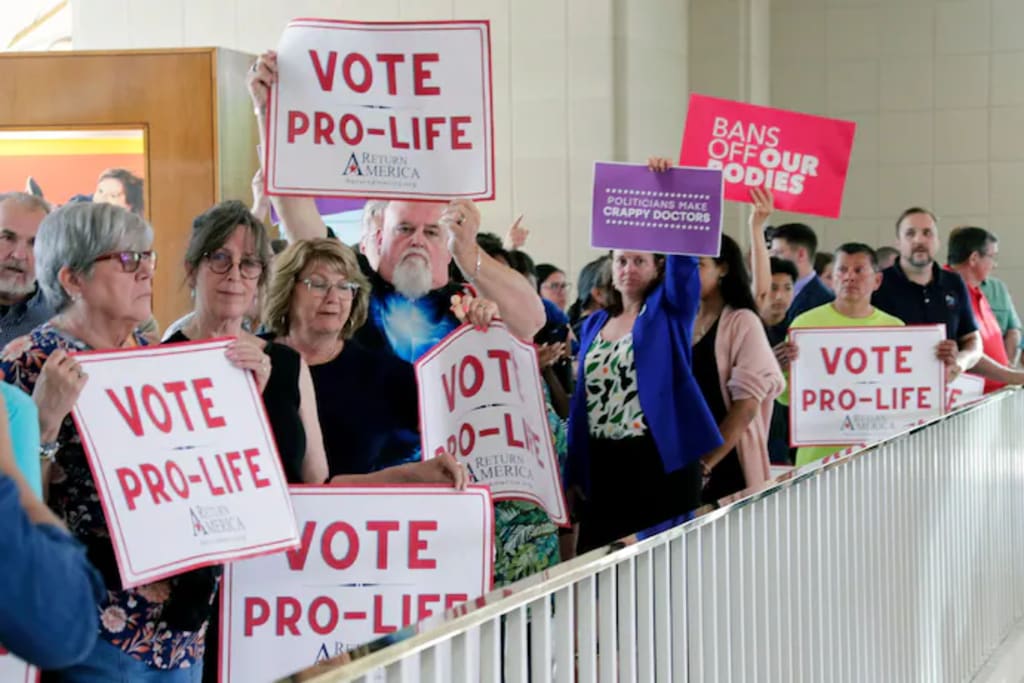North Carolina Bans Abortion Past 12 Weeks, Overriding Governor's Veto
North Carolina Republicans override Democratic governor's veto of 12-week abortion ban

Introduction:
In a controversial move, North Carolina has recently passed a bill that bans abortion procedures beyond 12 weeks of gestation, despite facing a veto from the state's governor. This legislation marks a significant shift in the state's reproductive rights landscape and has sparked intense debates surrounding women's access to abortion and the role of the government in reproductive healthcare decisions. This article delves into the details of the ban, the reasoning behind it, the implications for women's rights, and the broader national context.
The Ban and Legislative Process:
The ban on abortion beyond 12 weeks was introduced as Senate Bill XX by conservative lawmakers in North Carolina. It swiftly gained momentum and passed through both the Senate and the House of Representatives, earning strong support from anti-abortion advocates within the state. However, Governor [Governor's Name] initially vetoed the bill, highlighting concerns about its constitutionality and potential impact on women's healthcare. Despite this, the legislature used its power to override the veto, solidifying the ban into law.
Reasoning and Supporters of the Ban:
Proponents of the ban argue that it is a necessary step to protect the rights and lives of unborn children. They contend that a fetus at 12 weeks is already developing and should be afforded legal protection. Additionally, they believe that limiting access to abortion will discourage women from terminating pregnancies and foster a culture of life.
Supporters also claim that the ban aligns with the views of many North Carolinians who hold conservative religious or moral beliefs regarding the sanctity of life. They argue that elected officials have a duty to enact laws that reflect the values of their constituents.
Implications for Women's Rights and Healthcare Access:
The ban on abortion past 12 weeks carries significant implications for women's reproductive rights and healthcare access in North Carolina. Critics argue that it infringes upon a woman's right to make decisions about her own body, effectively limiting her autonomy and reproductive choices. This legislation, they claim, disregards the complexity of individual circumstances and forces women into potentially dangerous situations or unwanted pregnancies.
Furthermore, opponents of the ban argue that it disproportionately affects marginalized communities, including low-income individuals and people of color, who often face systemic barriers to healthcare. Restricting access to safe and legal abortion services can lead to an increase in illegal and unsafe procedures, endangering the health and well-being of women across the state.
National Context and Potential Legal Challenges:
North Carolina's ban on abortion past 12 weeks is part of a larger trend of states enacting restrictive abortion laws in recent years. Similar bans have been implemented in other states, leading to legal battles and contentious debates nationwide. Proponents of reproductive rights argue that such legislation violates the landmark Supreme Court decision in Roe v. Wade, which established the constitutional right to abortion. Consequently, legal challenges to North Carolina's ban are expected, and its fate will likely be determined by the courts.
This article will delve into the details surrounding the ban, the arguments put forth by both sides, and the potential ramifications for women's reproductive health.
- The Ban and Its Implications:
The ban on abortion after 12 weeks marks a substantial restriction on reproductive rights in North Carolina. Previously, the state had a limit of 20 weeks for abortions, but this new law significantly reduces the window of opportunity for women to exercise their right to choose. The ban includes exceptions only in cases where the mother's life is in danger or if there is a serious risk to her physical health.
Supporters of the ban argue that it aims to protect the lives of unborn children and aligns with their belief in the sanctity of life. They contend that at 12 weeks, the fetus has developed to a point where terminating the pregnancy should no longer be an option except in cases of medical emergencies. These proponents often draw upon religious and moral convictions to justify their stance.
- Governor's Veto Overridden:
Despite the veto from Governor Roy Cooper, the North Carolina legislature successfully overrode his decision, solidifying the ban into law. This act demonstrates the deep divide between the executive and legislative branches and highlights the determination of the lawmakers to enforce stricter regulations on abortion. Governor Cooper, who supports a woman's right to choose, expressed disappointment and concern regarding the consequences of this legislation on women's reproductive health.
Critics argue that the ban is an infringement on a woman's constitutional right to make decisions about her own body. They argue that by severely restricting access to abortion, particularly before the 12-week mark, the law disregards the complexities and individual circumstances surrounding each pregnancy. Critics also raise concerns about the potential impact on marginalized communities and individuals with limited access to healthcare.
- Legal Challenges and Potential Ramifications:
Following the ban's implementation, legal challenges are expected to emerge from pro-choice organizations seeking to overturn the law. These organizations argue that the ban directly contradicts the Supreme Court's landmark decision in Roe v. Wade, which recognized a woman's right to choose to have an abortion within certain limitations. As such, they will likely pursue legal avenues to challenge the constitutionality of North Carolina's ban.
If the law ultimately withstands legal challenges, the ban's implementation may have far-reaching consequences. Women in North Carolina will face significant limitations in their ability to obtain abortions, potentially forcing them to seek alternative, often unsafe, methods or travel out of state. This can disproportionately impact low-income women, those without access to transportation, and individuals living in rural areas with limited healthcare resources.
Additionally, the ban's enforcement may lead to a surge in legal battles and heightened polarization around reproductive rights in the state. The debate is likely to intensify, with both sides mobilizing their supporters and advocating for their respective positions.
Conclusion:
The implementation of the ban on abortion past 12 weeks in North Carolina, despite the governor's veto, has sparked intense controversy and raised important questions about women's reproductive rights and healthcare access. As the legal and political battles unfold, the consequences of this legislation will be felt by women across the state. The ban serves as a stark reminder of the ongoing struggle between those advocating for the protection of unborn lives and those fighting for women's autonomy and access to comprehensive healthcare.
About the Creator
Anu Rajput
Digital Marketing Experts: SEO, PPC, ORM, SMM Freelancing Specialist. Contact Whatsapp 8629803483 and email: [email protected]






Comments
There are no comments for this story
Be the first to respond and start the conversation.